How to be more sustainable in the kitchen: 25 Simple Ways to Cook More Mindfully
Whether you prepare three full meals a day or you’re a take-out queen (cough cough, me)– chances are, you spend some time in the kitchen. In fact, studies show the average adult spends about an hour a day in their kitchen. Meaning, it’s a great place to turn eco-conscious actions into everyday habits. But here’s the good news: you don’t have to buy a bunch of new products or pick up a slew of new skills to be a more eco-friendly cook. We find cooking more mindfully is less about using fancy cookware and buying pricey ingredients and more about adjusting our actions. From freezing food to picking “ugly” produce, there are truly so many ways to be more sustainable in the kitchen. After all, doesn’t food taste better when it’s made mindfully? 🌎
How to be more sustainable in the kitchen: 25 Simple Ways to Cook More Mindfully
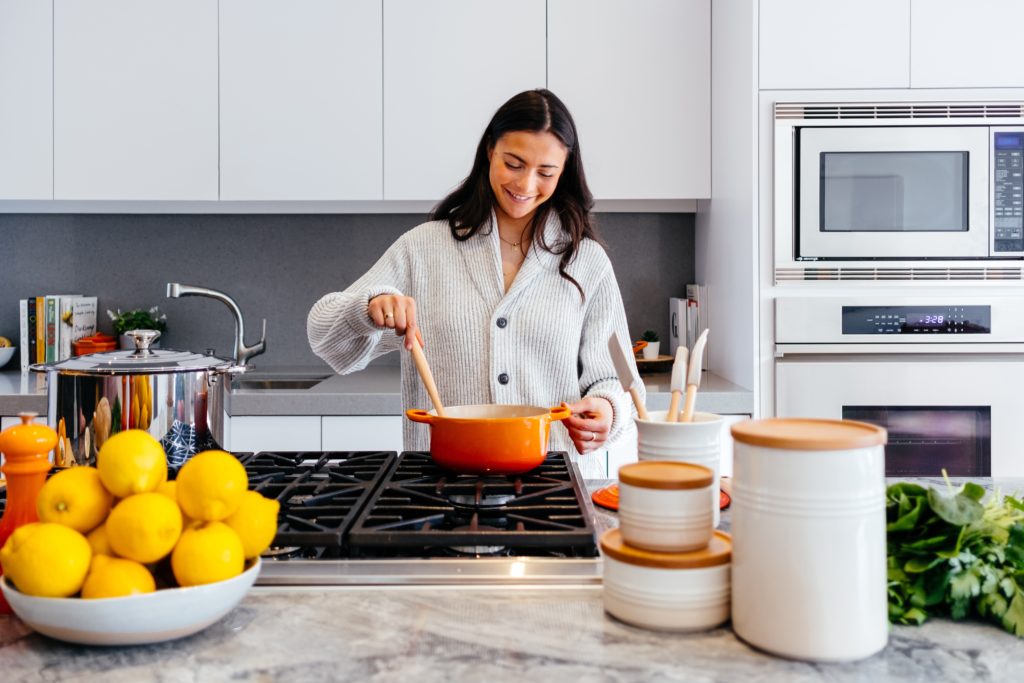
1. Shop local
You’ve probably heard this a million times. That’s because it’s true ! Eating local food is better for the Earth. There’s less transportation, packaging, and overall resources involved. So show some love to your local farmers and small businesses.
2. Don’t be afraid to freeze food
The extra cold temperatures will keep food edible for longer, which will help you avoid wasting food.
Here are our top freezer-friendly hacks:
- Cool food for an hour or two BEFORE putting it in the freezer
- Tight on freezer space? Ditch the clunky boxes of frozen food. We like to tape the cooking instructions/expiration date directly onto the package, but you could also write a note or even take a picture on your phone.
- Freeze your fruit & herbs
Check out this post for more freezer-friendly tips & tricks!
3. Love your leftovers
72 billion pounds of perfectly good food ends up in landfills and incinerators every year (yikes). But one creative way to fight against food waste is to repurpose your leftovers into new, equally delicious recipes. For example, if you have leftover rice — turn it into rice pudding. Or if you’ve got leftover pasta, whip up a pasta salad.
Looking for more leftover inspiration? Check out this post: 20 Drool-Worthy Recipes That’ll Make The Most Of Your Leftovers
4. Consider chopping food into smaller portions
This will help food heat up quicker → less energy used.
5. Get creative in the kitchen
Here are some of our favorite recipes that make use of food that often goes bad quickly or goes uneaten.
- Bananas = No Bake Banana Bars
- Avocado = Avocado Toast
- Blueberries= Blueberry Bubblegum Smoothie
- Tofu = Quinoa Fried Rice
- Almond milk = Easy Vegan Alfredo
- Miscellaneous veggies = Vegan Nacho Pizza
- Cauliflower = Buffalo Cauliflower Bites
6. Use reusable food wraps instead of plastic wrap
We like Etee Wraps and Wrappa.
View this post on InstagramA post shared by WRAPPA Reusable Food Wraps (@wrappa_reusablefoodwraps) on
7. Use your dishwasher (if you have one!)
Hand washing dishes typically involves more water than dishwashing. And while you’re at it, fill your dishwasher all the way up with dirty dishes before you turn it on.
8. Choose durable & reusable products over single-use
We love bamboo spoons, stainless steel cookware, and cork cutting boards.
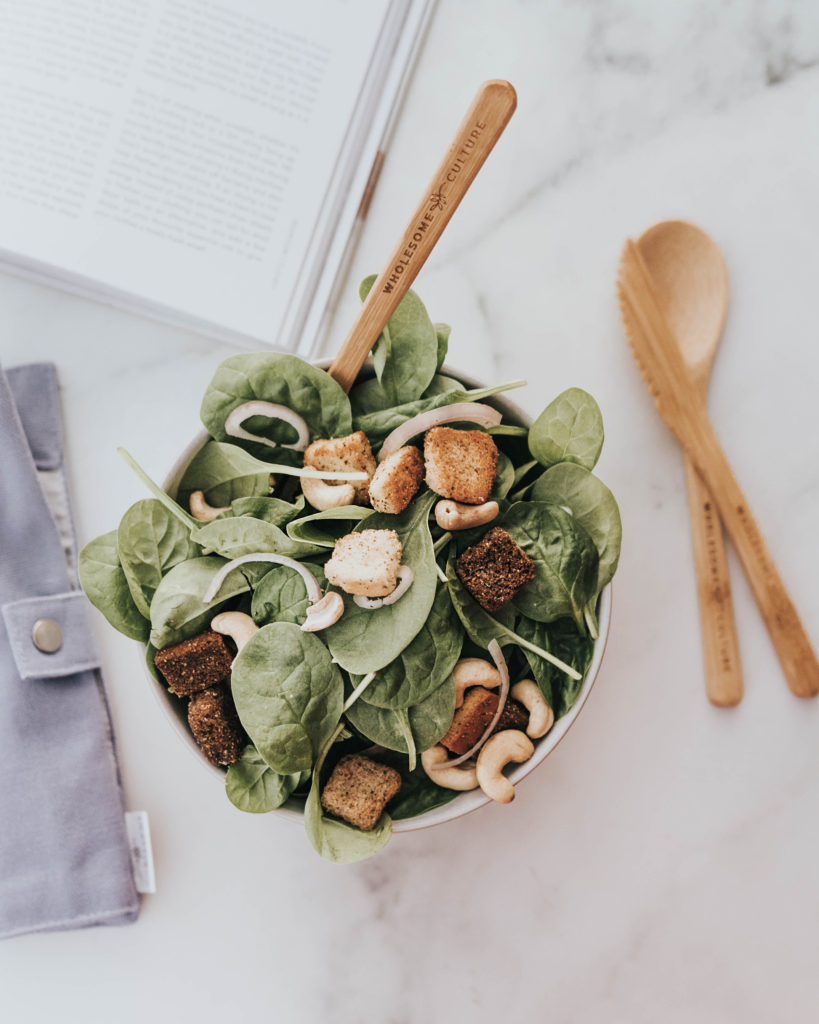
9. Question pre-heating
According to Epicurious, if your dish involves eggs or flour, pre-heating is probably necessary. If not, you may not need to wait around. Less energy, less waiting. Win, win!
10. Be mindful of your water use
Try not to leave the faucet on unnecessarily. And consider soaking pots and pans rather than scrubbing them with the water running.
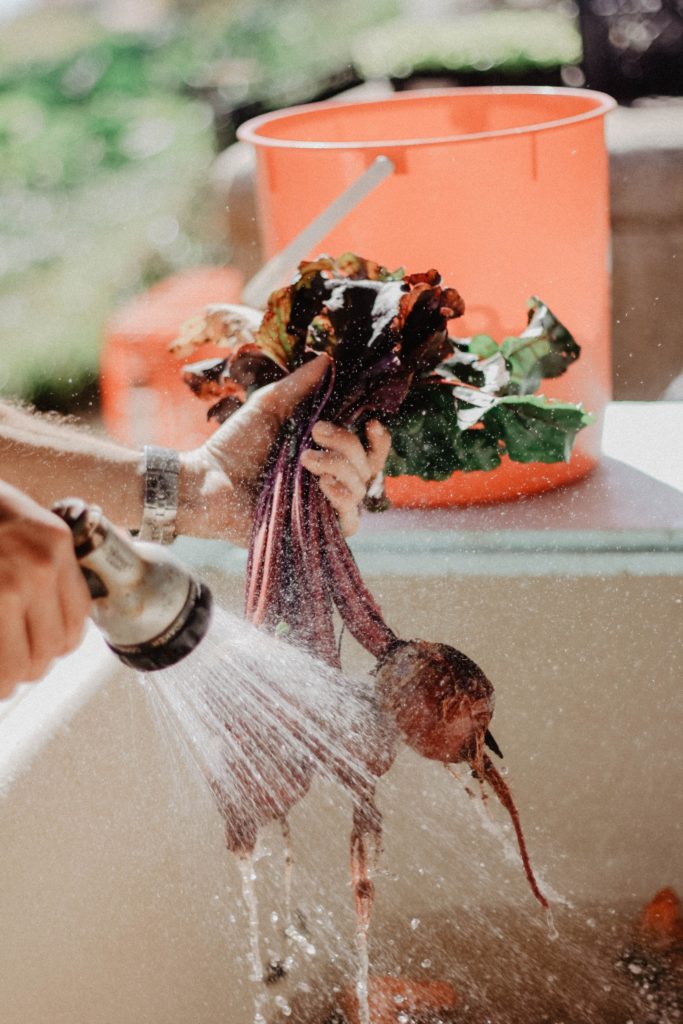
11. Ditch paper towels
A cloth towel can do the same job and be reused many more times.
12. Compost food scraps.
Check out our full guide to composting, here
13. Clean with toxic-free products like vinegar and baking soda
Vinegar and baking soda are AMAZING cleaning agents, plus they’re non-toxic and probably already in your pantry, which will save you an extra trip to the store.
Here are a few ways to clean with vinegar:
- Vinegar + water can = effective cleaner for windows, floors, and even grout
- Keep your microwave clean by boiling vinegar and water. Wait for steam to form, and it’ll be easy to wipe away the residue
Here are ways to clean with baking soda:
- Combine baking soda with water to remove mold
- Use it to scrub pots and pans
- It has odor absorbing properties, so you can stick a box in your fridge to keep it smelling fresh or even sprinkle some in a trash can to avoid smelly wafts.
- Add baking soda onto a grimy stovetop, let it sit for a few minutes, and then scrub it gently.
Do you prefer a more traditional household cleaner? Check out Ecover products.
Check out more eco-friendly cleaning tips here: 11 Planet-Friendly Ways To Clean Your Home
14. Fill your sustainable kitchen with naked produce
You’ll save Mother Earth from all that plastic waste!
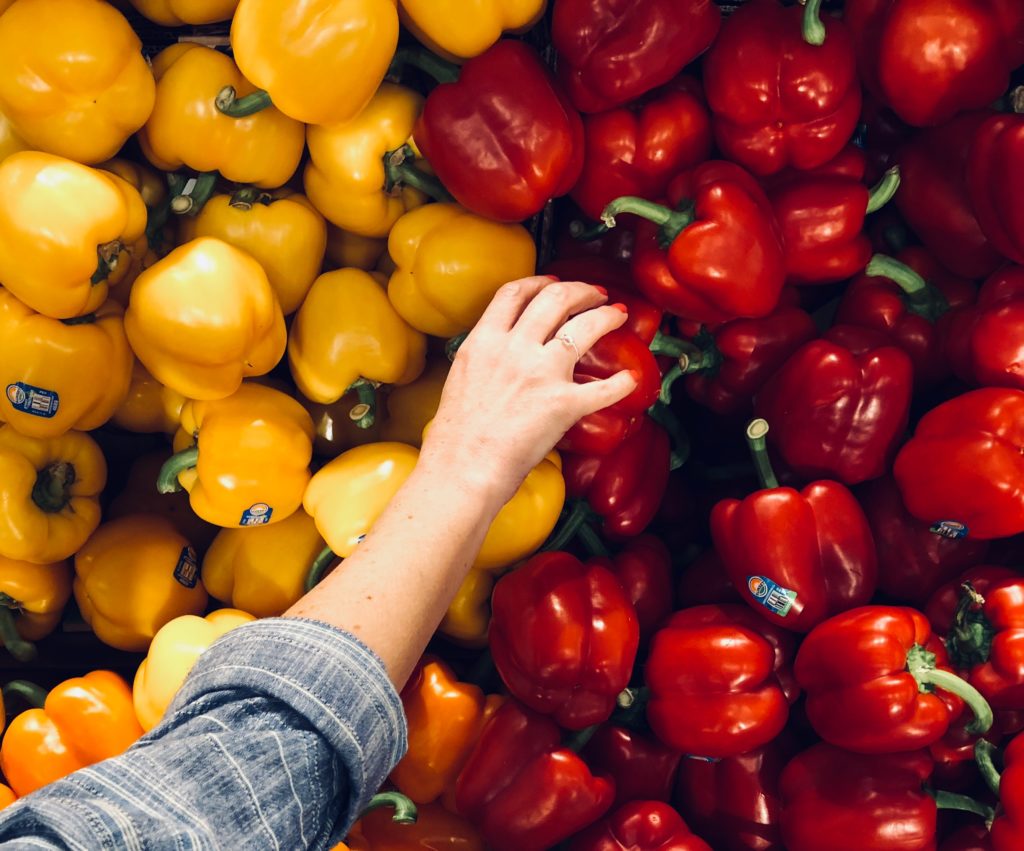
15. Try your best to keep your fridge clean
How does this annoying chore make a difference for the planet? At least for us, we find that when our fridge is clean we’re more likely to see what’s inside. This helps us know what to eat before it goes bad and prevents us from buying things we already own –> saving waste.
16. Store food in plastic-free containers
Mason jars, glass containers, reusable food wraps, and reusable silicone zip lock bags are all eco-friendly ways to store food with the planet in mind.
17. Remember your reusable bag!

18. Take advantage of toaster ovens
Conventional ovens use a lot of energy, so if you don’t need to use one, try not to.
19. Cook with the lid on
This will help reduce the overall cooking time and lower your energy use.
20. Keep your fridge door closed as much as possible
We know it’s tempting to just stare at food when contemplating what to eat for dinner, but try to resist!

21. Meal prep
If you cook once and eat three times = lots of energy saved. Go you! Here are 5 lunches you can prep in advance for the best week ever. And don’t miss this post with absolutely everything you need to know about meal planning.
22. Pick “ugly” produce
Lots of funny-looking or “ugly” produce gets tossed even though it’s perfectly healthy.
23. Unplug small appliances when they aren’t in use
Coffee machines and toaster ovens, we’re looking at you.
24. Throw out less food
One third of the food produced in the world is wasted for various reasons. Of that, fruits and veggies have the highest wastage rates. Here are 8 simple ways to reduce food waste.
25. Love your plants
Whether you’re a plant-based eater already or considering starting Meatless Mondays, eating more plants and less meat is an awesome way to show Mother Earth you care.
Want to learn more ways to live a more eco-friendly life? Check out these reads:
- Here are 31 ways to be plastic-free for every day of the month
- Want an eco-friendly diet makeover? Here’s how to make it happen
- 5 ways to be more mindful of your palm oil use
- 8 real ways you can save the Amazon Rainforest now






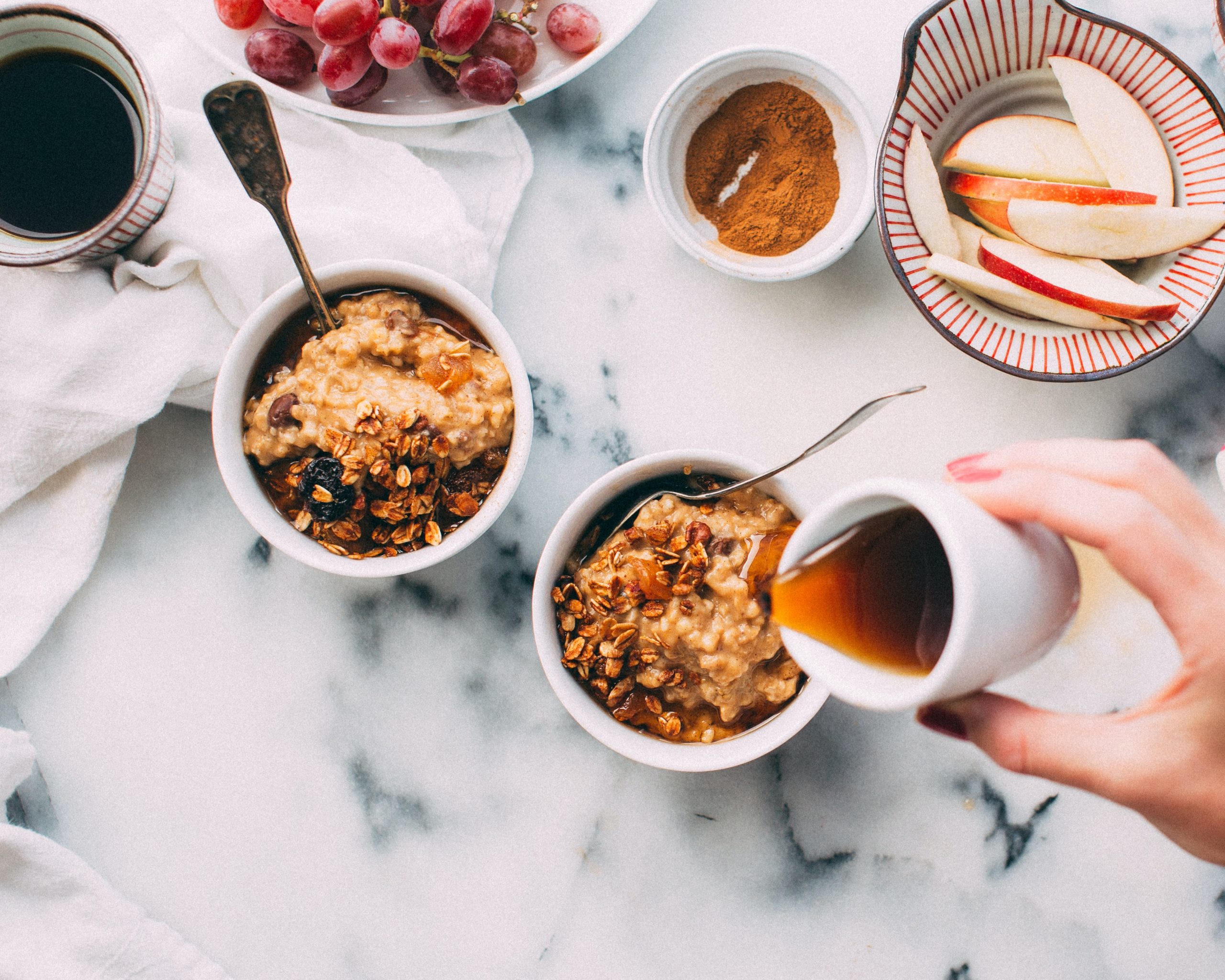



Hi! I LOVE your newsletter!
Can you tell me more about silicone zip loc bags? I’ve tried the wax fabric sheets but since they are colored my daughters don’t look at the dishes underneath! Are the silicone bags eco friendly?
Thanks
Hi Christy! I love using Stasher Bags — they’re made of silicone, reusable, and come in lots of pretty colors and patterns. They also have a great seal to keep things secure! I’ve also heard good things about ZipTop, but haven’t tried them myself yet. Hope this helps!